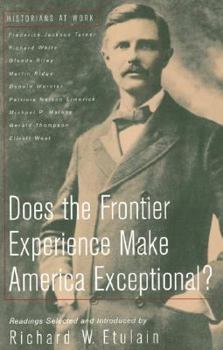Does the Frontier Experience Make America Exceptional?
Select Format
Select Condition 
Book Overview
At the Chicago Exhibition in 1893, Frederick Jackson Turner set forth his thesis that the frontier, an ever changing boundary that defines civilization containing the Wild West, made America unique.... This description may be from another edition of this product.
Format:Paperback
Language:English
ISBN:0312183097
ISBN13:9780312183097
Release Date:April 1999
Publisher:Bedford Books
Length:132 Pages
Weight:0.48 lbs.
Dimensions:0.3" x 6.2" x 9.1"
Customer Reviews
3 ratings
For any historian, this book is a must-have.
Published by Thriftbooks.com User , 14 years ago
This book is a must have for historians and students who are interested in American Exceptionalism and Frederick jackson Turner's Frontier Thesis.
Easily understandable college textbook
Published by Thriftbooks.com User , 17 years ago
As a long time student of American history, this book ranks high on my list of must-haves. Starting with Frederick Jackson Turner's original lecture given in 1893, the book goes on to provide reactions from more current western scholars. Scholar Martin Ridge gives us an easily understood briefing of Turner's ideas, adding his skills as a communicator to Turner's established ideas. Otherwise, the book can be seen as a telling representation of how certain intellectuals in our society go about trying to make names for themselves by accusing previous generations of breaking currently popular taboos. Glenda Riley's take on Turner is that he dismisses the contributions of women. Then on the last page of her article, she admits that Turner did publish a study of pioneer's children in 1926 that includes an account of the success of women such as Jane Addams and Carrie Chapman Catt. Ridge nullifies her article further in a single stroke as he explains that Turner's writings were written for wide audiences, and were meant to be understood as generalities, not anecdotally. Patricia Nelson Limerick resorts to shock value to make a name for herself, as she refers to "white" people as an "odd" category, and claims that Turner's use of the term "frontier" is racist. She tries to close the book on all further discussion by saying flat out that Turner is "wrong," and she evidently knows that by using politcially charged words like "racist," she can get more bang for her buck. What she doesn't get around to explaining is that if women and minorities are equally responsible for the conquest of the west as are white men, which is something she desperately wants us to believe, then they must also be equally responsible for the defeat and removal of Indian Tribes from their previously held land, which is probably something she does not want to acknowledge. Donald Worster attempts to change the whole debate from a concept of the West being a changing frontier, to a study of the West as a geographical place. He claims that this geographical area includes the Dakotas, Nebraska, Kansas, Oklahoma and Texas, and everyplace west of there and his evidence is that, "I know it in my bones." He says he could never understand the west as Turner did, as a process in motion. The value of this book is that it brings to light many interesting and debatable theories about our common American heritage. I hope that our systems of higher education will allow equal time to both sides of such debates in the future.
Reconsidering Frederick Jackson Turner's Frontier Thesis
Published by Thriftbooks.com User , 22 years ago
Wisconsin History Professor Frederick Jackson Turner came up with the "Frontier Thesis," the idea that it was the frontier that was the most important factor in shaping the American nation. Turner linked American democracy, nationalism, individualism, as well as physical and social mobility to how pioneers faced the frontier as they moved the boundaries of the United States westward. Richard W. Etulain presents four essays responding to Turner's Frontier Thesis and the question "Does the Frontier Experience Make America Exceptional?"Richard White's essay compares and contrasts how Turner and Buffalo Bill Cody interpreted the closing of the West at the end of the 19th-Century. White sees these narratives as having some elements in common but ultimately offering competing narrative explanations. In her essay Glenda Riley notes that Turner clearly ignored women from his story of the Frontier and outlines what he may have missed as a result. Martin Ridge focuses on the influence of Turner's thesis and characterizes Turner as sort of the high priest of American exceptionalism. Finally, Donald Worster notes that historians have essentially dismissed Turner's theory since the 1950s and considers what appropriate interpretation should be offered. Worster argues that historians should return to the interpretation offered by Walter Prescott Webb, who considered the West as an evolving place separate from what was happening in the big cities on each coast. I have always considered Turner's "Frontier Thesis" to be the prime example of historiography when it comes to introducing the concept to students. From talking to students it is clear that the Frontier Thesis has not been taught in schools for years, which is a shame because since the thesis so eminently debatable, as this collection of essays proves, it remains the perfect way of making students aware that what we teach as history is a collection of arguments rather than the "true" story of what "really" happened. As such, this volume is a useful source of alternative theories as well as insights into the strengths and weaknesses of Turner's ideas.





